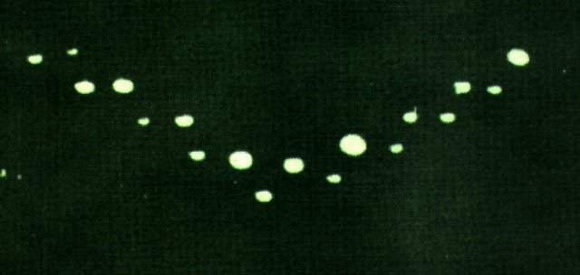UFO Photographs: North America
August 31, 1951 - Lubbock, Texas, USA

Background Information / Description:
Lubbock Lights, 1951
EXTRACTS OF REPORTS:
"Four Texas Technical College professors were sitting in the backyard of one of [their] homes... [watching for meteors]... they observed a group of lights pass overhead from N to S. The lights had about the same intensity as a bright star but were larger in area. Their altitude was not determined but they traveled at a high rate of speed. The pattern of the lights was almost a perfect semi-circle containing from 20 to 30 individual lights. Later in the evening a similar incident was observed and during a period of about three weeks a total of approximately 12 such flights were observed by these men... Attempts were made to obtain an altitude measurement... however all attempts failed because the objects did not appear on the nights the observers were waiting for them... The objects were observed by at least 100 people in and around Lubbock..."
"On the evening of 31 August 1951 at about 2330 CST (11:30PM), a college freshman observed a flight... pass over his home... two more flights of objects allegedly did occur and were photographed."
"In one instance, the lights were observed to have a "wiggling" motion. "at 12:17am on 09.02.1951 by 5 people ... in the case of this flight, an irregularly shaped yellow light appeared in the rear. The formation included dark diffuse areas and the arc itself quivered or pulsated in the direction of travel.. a group of individually distinct yellow flames, approximately 12 or 15 in number, travelling at extremely high velocity, each with an angular magnitude that would be the equivalent of 12 inches across at a distance of 30 or 40 feet and in violent agitation... moving noiselessly."
"There was no sound that could be attributed to the object; the color of the lights was blue-green; there were from 15 to 30 separate lights in each formation; the first two flights observed were a semi-circle of lights but in subsequent flights there was no orderly arrangement; The object did not gradually come into view as would an aircraft approaching from a distance, neither did it gradually disappear; there was no apparent change in size as the object passed overhead; the angular span was estimated to be 10 degrees."
One observation was of a dark and diffuse dark area with "violently agitated" yellow flames emitted to the rear.
"There is relative movement within the [photographed] formation of spots, so they are not lights on a fixed object. The relative motion is such that it is unlikely they are co-planar and photographed from different angles... The angular size corresponds to an object size of 310 ± 30 feet, seen by the camera 1 mile away. The actual size of the formation may be calculated from this ratio, if the actual distance from the camera can be determined... Although the image size in frame 8 is about 2% less than in frame 7, suggesting that the objects are receding from the camera, the aspect of the V formation does not correspond to a horizontal V travelling parallel to the earth's surface unless at an enormous altitude." Object Behavior "The angular velocity of the object was very nearly 30 degrees of arc per second; the flight path was from north to south in the majority of the flights; there were two or three flights per evening; the period between flights was about 1hr and 10 mins; the objects always appeared at an angle of about 45 degrees from the horizontal in the north and disappeared at about 45 degrees in the south."
(Thanks to the "UFOs at Close Sight" website for the above background information.)
Source / Credit: Edward Ruppelt, "The Report on UFOs", and USAF Project Blue Book Original source webpage / article
Photograph ID: 45 ID: 45FAIR USE NOTICE: This page may contain copyrighted material the use of which has not been specifically authorized by the copyright owner. This website distributes this material without profit to those who have expressed a prior interest in receiving the included information for research and educational purposes. We believe this constitutes a fair use of any such copyrighted material as provided for in 17 U.S.C § 107.





